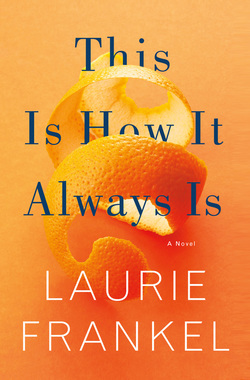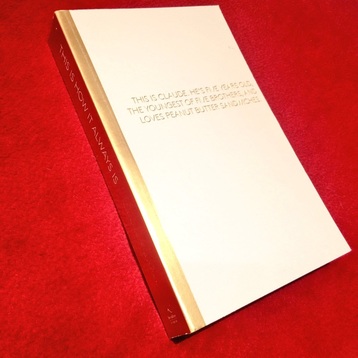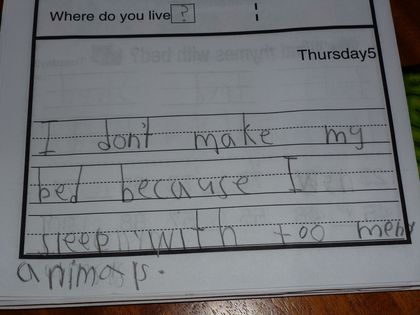|
It is October, so I am watching baseball while I type. I know that October means pumpkin-everything to lots of you and changing leaves and cozy nights when the dark comes early. To me, it means the end of baseball, an ending that's been particularly harsh this year (now and forever: Let's Go O's).
However, October also often enough means I'm in prepublication mode because I have a book coming out in not very many months. And so it is this year: I have a new novel out January 23, 2024. It's called FAMILY FAMILY. It's about, well, family, as well as adoption (near and dear to my heart) and Broadway (ditto) and dream jobs (also ditto). Post-season baseball is strange because the season is over, but in other ways the most important part is yet to come. This is true of 2023 too -- nearly over but with much of significance yet to play. And it is the state I find myself in with the book: it's out of my hands, but it's not yet into yours, and so...postseason book publishing: Done and still to come. Finished but full of change. Much of significance yet to play. I can't wait. I hope you'll love it.
0 Comments
A blog post about a blog. I know. I can't believe it either.
It's been a few years since I've kept this blog regularly (and "regularly" was a stretch even then). There's an extent to which blogs are so 2008, and here it is 2020 (so it's dated and plus hoo, wow, 2020 is a very strange year). I'm redoing this website for my out-next-spring new book (!!!) and thought about getting rid of this blog altogether since it's been so long since I posted anything new. HOWEVER, readers often tell me they appreciate what's here. So here it stays. If you're here -- and you are -- thank you, thank you for reading! A year ago tonight I made my kid go to bed, election returns only beginning to come in, because we live on the west coast and small humans cannot stay up until the end when there is school in the morning. "Wake me when Hillary wins," she said, and I promised to do so, so when I came in the next morning, she was pissed. And when I told her why, pissed wasn't the half of it. Like so, so many of us, she was appalled, afraid, angry, and at a total loss. She goes to an elementary school whose motto is "kind, safe, and fair," so she was in no way prepared for the outcome of that election.
This morning I woke her up with this picture of Danica Roem, newly elected Virginia state legislator and transwoman. Also the news that a gay woman had been elected to be her city's mayor. Also the news that Democrats of color, like her, had been voted into office all over the country. She was thrilled. She also wondered whether Danica Roem's mother was more gentle than hers with her long hair, tangles being a political scourge this country has yet to come to terms with. (This is why nine-year-olds can't vote.) I was able to implicitly and effortlessly and crystal-clearly make two points to my daughter this morning. One, for the first time in a year, was this: the world may not yet be ending; people may yet be loving and smart and broadminded and fair; all is not lost; good is still coming. And two: transgender people can be anything; transwomen can win; you too can and will and must go forth and make the world a better place. A lot of people on our side have been bemoaning this year what's loosely termed identity politics. A lot have said it's distracting or it's not time or it's divisive. And that's bullshit. Identity politics is politics. (Like the personal is political. Remember when that one was revelatory?) When one's identity is politicized, that identity becomes political. And when one's identity is politicized, representing in all arenas, including politics, could not be more important. Danica Roem stood up for diversity and inclusion and celebrated differences and level playing fields and, yes, transgender people in the face of an incumbent who was literally running on the identity of being a homophobe (his word). And she won. And so did my daughter. And so did I. And so did all of us. All of you. Everyone in the world. (Even the homophobes.) There's no point in winning if we're not doing identity politics. And maybe not every time, but eventually, diverse, inclusive, celebratory identity politics won't just be the path of righteousness, it will also be the path to victory. Today is LGBTQ Families Day, a day which one celebrates by having a day just like any other. Over at Mombian, there’s a list of blog posts written in celebration of this day, and it seems to me that, taken as a whole, the point is very humdrum: LGBTQ families are just like any other kind of family. I don’t mean this in a sweeping, romantic, love-is-love sort of way. I mean this in a much more mundane way. My kid is LGBTQ, but that’s much less pressing than her being a kid. She necessitates getting up at six every morning, planning and executing a gajillion meals and snacks every day, doing a gajillion loads of laundry every week, making a gajillion trips to the grocery store/library/playground/park, fighting over math homework, fighting over dessert, undergoing relentless interrogation, and deleting without even reading emails about last-minute saver fares to Reykjavic and Hawaii. This is what having an eight-year-old is like for everyone who has an eight-year-old. That she’s also trans is usually secondary. Kids are kids first: you’re desperately in love with them and also constantly wondering why they must be such a pain in the ass. This would be weird if they weren’t a) kids and b) yours. Since they’re both, that odd balance is perfectly ordinary.
Never mind anger, never mind fairness, never mind notions of rightness and equality, what I find most endlessly puzzling about movements to deny LGBTQ rights is simply this: Why???? Every day, my family is nothing so much as utterly, boringly, wonderfully, maddeningly exactly like yours. I’d write more, but I have to go fold laundry now. Last night, my eight-year-old asked me what ambition meant.
I said it’s something you hope to work hard to do. She said, “Then why is it bad that Hillary Clinton is that?” This is a fair question but a tough one to answer. Then she said, “What are your ambitions?” This is the sort of question that eight-year-olds love to pose and that are often very difficult to answer. The answers are too complicated to distill into something comprehensible by a child or too big to discuss in the time allotted (she was brushing her teeth; her toothbrush’s timer was counting the moments) or too hard to formulate first thing in the morning or at the end of a too long day or too sweeping to narrow down to something manageable. But in this case, I knew instantly and answered easily. “My ambitions are to raise you up to be a strong, smart, happy, successful human in the world and to write words that make that world a better place.” Some days that seems doable, some days not so much. Some days that seems modest, some days impossibly grand. Some days the first part seems much harder than the second, a fact which is telling about so many aspects of my life. But as far as ambitions go, at least they’re clear. Don’t you hate it when writers are all, “I have a new book coming out,” but they don’t tell you what it’s about? Me too. How are you supposed to know whether you want to read it or not when you only have the cover to go on? In this case though, the cover is awesome: I had nothing to do with it. I take no credit. The cover is all down to the geniuses at Flatiron Books. It looks like sun and warm and mystery and promise. In the UK, they’ve sent out these gorgeous gold foil galleys with just a little bit of intriguing text. So same: warm, shiny, mystery, promise. Gold foil doesn’t usually say minimalism, but that’s just the kind of miracle the book designers at Headline Publishing pull off. None of which really tells you what the book is about because covers are so much better when they aren’t on the nose. But one still wants to know. So…
My sexy pitch is: This is a book about a family with a secret. And families with secrets don’t get to keep them forever. My provocative pitch is: This is a book about how children change…and then change the world. My romantic pitch is: This is a book about revelations, transformations, fairy tales, and family. My what-the-hell-does-the-title-mean explanation is: This is a book about the ways this is how it always is: Change is always hard and miraculous and hard again; parenting is always a leap into the unknown with crossed fingers and full hearts; children grow but not always according to plan. And — thanks for being patient — my just-tell-me-what-the-damn-book-is-about pitch is: THIS IS HOW IT ALWAYS IS tells the story of a family with five boys, the youngest of whom becomes a girl. This post has been mostly informational. Pbbbttth. Next up: Intrigue. Personal revelations. Tell alls. All that good stuff. I had all kinds of titles for this post. “Anew” was one. “Coming soon” was one. “My Very Mixed Feeling About Social Media” was one. “There Are No Secrets And Everyone Knows Everything About Everything And There’s Nothing You Can Do About It” was probably never going to be the title of this post, but only because it’s a little unwieldy, not because it isn’t true.
I’m afraid this blog post is going to be a little coy. Apologies. It’s hard to talk about stuff because stuff is overwhelming and because, as we’ve already discussed above, once you broach it on social media, there are no secrets and everyone knows everything about everything and there’s nothing you can do about it except share slowly and mindfully to begin with. So I don’t intend to be coy or withholding. But there’s more to come. That’s a good thing, isn’t it? I have a new book, This Is How It Always Is, coming out in January…about which more soon. I’ve been pretty absent on social media…about which also more soon. For the moment, suffice it to say this: thank you for sticking around; thank you for coming back. When you put a pic of your new book’s new cover up on facebook and the first thing that happens is that a lot of people you love love it (and you) back, it’s really a wonderful thing. What this world needs now — and always — is love. This is how it always is. So thank you for sending love. And more (more love, more words, more art, more details) soon. Many people before me have compared book writing and publishing to child rearing. The metaphor is an apt one on any number of fronts. For me, the biggest though is this: neither book writing nor parenting has been remotely what I expected. And I did not go into either one -- especially parenting -- either starry eyed or naive. And yet, I have been wrong and wrong and wrong again about both at every turn. My guesses, my expectations, my anticipations are constantly thwarted and therefore disappointed. Between one and the other (which, together, make up a portion of my brain space nearing 97%), I spend most of my life surprised, shocked, blindsided, and just plain wrong. One of the things I was wrong about was kindergarten. I was expecting blocks and singing and art projects. Then we got D's first report card and learned she was slightly underperforming in algebra. (Note I feel I must add: she brought that algebra grade up by the second report card.) Another thing that's been surprising about kindergarten is there's homework. In the way of predictability, I would like to offer exhibit A, a sample of D's kindergarten homework. The assignment was to write up how to make your bed. She wrote this: She does. She sleeps with a lot of animals. Also her bed is really high off the ground so hard to make. Also she sleeps under a comforter only, so there's not much making to do. That is not my point though. Here is my point: I helped with this homework; I spelled "animals" for her. The apostrophe in "don't" and the correct form of "too" however were all her. This puts her ahead of a large percentage of my former college students already, and she's only five. (Suck on that, algebra. Good grammar? Totally useful in daily life. Algebra? Haven't used it since high school.)
D and I made muffins for breakfast the other day, and when she presented them proudly to her father, D added that when she grows up and gets married, her husband or wife will be so happy to be married to someone who can cook. I learned long ago that most of what D does is not something I should either take credit or blame myself for. It's probably not my fault. It's probably nothing I did right either. She is, like so much of life, out of my control for the most part. But these are the things that make us proud around here. Proud and hopeful and, well, a little surprised. I love nice hotels. I also like slightly less nice hotels as long as I get to stay for more than one night. The miracle of even crummy, cheap, roadside motel type hotels is you leave for a few hours during the day, and when you come back, it's all clean and nice and new again, and you get to start over. There's something very perfect about that. Plus it's a pretty good metaphor. More often than you'd think, I set scenes in hotels. My first book opens in the Waldorf=Astoria (equal sign theirs) where I just went for the first time on a research expedition for novel number three which also opened there but doesn't anymore for reasons not clear to me until I set foot in the place. Also fodder for another day. Outside, there was this sign: which probably wasn't actually a directive from the universe to me but certainly felt like it. It's a gorgeous old hotel. Then there's this gorgeous new(er) hotel which I also visited for book research: the Ritz-Carlton New York, Battery Park (whose hyphen, let's admit, is a little passé). A scene I was writing hinged on the view from a suite in the hotel, so I needed to see a suite in the hotel and look out its windows. It was pouring rain in NYC, and I was wandering around in only a raincoat and hat because I am a Seattlite now apparently, and so a forecast of rain no longer suggests to me that I should bring an umbrella. Thus I showed up in the lovely empty lobby of this very posh hotel, soaked and dripping and bedraggled and asking politely to see and photograph a $1500 a night hotel room. The concierge was quite, quite skeptical. I explained as to how I was writing this book and really it would take only a minute and I promised not to even drip on anything. And he paused and looked askance and went and whispered with someone else and looked tempted to call security and looked tempted to throw me out and looked somewhere between alarmed and appalled at my very existence and said, down his nose, "I don't suppose you have a card or anything." I do. I fished around in my wallet and produced it for him. And a switch flipped. Suddenly, he was terribly solicitous and all smiles, very eager to help, very kind, delighted to take me up and let me into a room that was maybe one hundred times lovelier even than it had been in my imagination. Generally they require a permit for photos he said but I should feel free to just go ahead and take as many as I pleased. You understand I ordered these cards online. And you could too. They aren't certified by the Library of Congress or anything. This is the sort of reception one hopes will greet the revelation that one is writing a book. And it never, ever happens. So I was gratified. And as an aside, if you've the means, the suites at the Ritz-Carlton seem entirely worth $1500 dollars a night in my opinion. And they do keep out the riffraff. "This telescope is provided for your enjoyment while a guest at this hotel. Should you wish to take it home with you, a $1,000 dollar surcharge will be added to your account." (I am just kidding. Probably if you pay $1,500 dollars a night for a hotel room, they throw the telescope in for free. Like how it's implied in your $99 a night hotel room that you may take your leftover shampoo if you wish.) In fact though, the case I want to plead is for the opposite kind of hotel room. I did a couple book events recently at a wonderful bookstore called Auntie's in Spokane, Washington. Spokane is so far east of Seattle it's very nearly in Idaho, and its hotels were all booked so I stayed a bit out of town, even easter, maybe only eight or ten feet from the border in a Comfort Inn which cost not even 100 dollars a night and was exactly what you are imaging. And it was perfect. In New York City, it doesn't matter how nice your hotel room is -- there's too much else good on offer to spend very much time there. In between Spokane and the Idaho border? I think there was a Subway down the street where I could have hung out, but otherwise nothing. So I sat in the room and wrote. All day. The room was spacious and neat and comfortable with a nice big window (overlooking the parking lot), climate control free and at my fingertips, a large desk and chair, free wifi, a TV in case I needed a break, a bed in case I needed a nap. Just downstairs was a hot tub, a workout room, a pool so I could have a little (very little, but still) swim. When I finished availing myself of these, I returned to a newly clean room, newly made bed, sparkling bathroom. Breakfast was plentiful and included and did not even require my putting on shoes (I did. But I didn't have to.) plus hot coffee and tea all day long plus soup in the late afternoon plus cookies in the evening. It was quiet and interruption/distraction/temptation free. For $99 a night, you could do a lot worse in the way of a writing retreat. There's much ado these days about romantic writing retreats -- on the train, say -- and though I get the romance, a train is going to be much more cramped and loud and public and distracting and with way grosser bathrooms and a much flimsier desk than one's very own hotel room. For me the only wrinkle is that Practically-Idaho is a solid five hours from Seattle, and though the ride there had been 60 degrees and sunny and so I'd put the top down on the convertible, when I left to go home, it was 35 degrees, and I could not get the top back up. And having packed for the former -- and for being in the car besides -- I'd not even brought a jacket. FYI: car heat does not stay in your car at highway speed if you don't have a roof. Strange but true. It was a long, cold drive home. But a good writer's retreat. A trade I am always willing to make.
I've taken a little break from blogging about writing books in order to actually write books, a good trade as far as I'm concerned, but it's good to exercise the blog-muscle too. (Or really any muscles -- I also exercise somewhat less when I'm in the writing throes than when I'm in the prepping-for-writing-throes. My agent's point, and it's a good one, is, "Everyone can exercise. Not everyone can write." Fair enough.) Also we adopted a puppy from this very great shelter (should you find yourself in the greater Seattle area and craving a pet) called PAWS. Does everyone want to see a picture of said puppy, even though really she's a subject for another post? Of course you do. ANYWAY, the point of this post is not to look at puppy pictures nor to recommend a book but -- wait for it -- a book review. Never in my life have I recommended a book review. Never in my life has anyone recommended a book review to me. I can't recommend the book because I haven't read it yet. But the review, well, the review blew my mind. It's by Katie Roiphe for Slate on a new novel called The Blazing World by Siri Hustvedt. (Is it bad form to link an entire sentence? Whatever.)
I like Katie Roiphe though boy does she piss people off. Which is some of what I like about her. She started off pissing people off -- that is, she remains most famous for her first book, The Morning After, which argued (in 1993) that that statistic you hear that one in four female college students will be raped at school is a load of shit. She further argues that saying so does everyone a tremendous disservice and that saying to women who had sex when they wished they didn't that it wasn't their fault because they were drunk or felt bad basically keeps women second class citizens. What has always impressed me about this book is not the argument itself but that she wrote it in grad school while getting a PhD in English. Getting a PhD in English seems like it should have something to do with writing books, but it really doesn't, especially not this kind of not-about-literature book. Her writing this book during graduate school seems to me about as impressive as learning a foreign language during the World Series. I will also say it was timely and provocative, and too little is. She writes for Slate now, as well as other publications as well as other books, about a whole variety of topics, which itself has been criticized as selling out in some circles, that she was going to be this feminist academic powerhouse and instead is writing memoir and book reviews and thoughts on parenting and marriage (because really, what kind of feminist cares about self, books, parenting, or marriage? Jeez.) Anyway, this is a person who both can't win for losing and wins big time for losing, so even when I disagree with her -- she wrote an article once about how ridiculous parents are to get so worked up when their kids won't sleep and she just lets her toddler wander around her apartment all night -- I am challenged and intrigued. And challenged and intrigued are good. I will also point out the obvious which is two-fold: 1) much of the problem with her being edgy, provocative, critical, dismissive, judgmental, and prone to not giving a shit what other people think of her is that she's also female (as are her harshest critics). And 2) as you will recall from the start of this sentence, even though that's obvious, I feel the need to point it out. All of which is to say: when Katie Roiphe says stuff, you'd do well to give it some thought. And in this book review, she wonders whether, "in coming years, the most provocative work in feminism will be in novels....It may be that the challenges currently facing feminist thinkers, the subtleties of how sexism plays out...are better dealt with in fiction. Now that we no longer need to name or discover it--'Sexism exists!'--the flatfooted outrage...is too crude, too simplifying, too unchallenging, too predictable, and the novel's delicate touch may be precisely what is called for." (Bold ecstatically mine.) How great is that? Like many in my generation, I came to feminism early and without question. Then I read a thousand pounds of feminist theory in grad school from which I learned a lot of history but a very little praxis. My search therefore has been where to go from here. We've ferreted sexism out, but my generation has neither done nor said very much new about it. Roiphe's point is ferreting it out -- pointing to it, linking to it, blogging about it, lecturing about it, non-fictioning about it -- has proven insufficient. So perhaps fiction is the feminist way forward. Novels are how the message progresses and minds are changed and consciousness is raised and change occurs. Novels, AS ONCE THEY WERE, will be again where the new, smart, strong, provocative, important, political, timely things are being said on this front, said and heard and germinated. My own bias is for novels anyway. I am entirely a proponent of fiction being more true than non-fiction (after all, you can make it up). I have never had to be convinced that fiction matters and matters most of all, the case for which is a feminist one both historically and critically anyway. And still this seems revelatory to me. This makes me stand up and cheer! Who gets to carry the feminist mantle into the next wave? Novelists! To which I say: a) hell yeah and b) I'm so on it. |
About The AuthorLaurie Frankel writes novels (reads novels, teaches other people to write novels, raises a small person who reads and would like someday to write novels) in Seattle, Washington where she lives on a nearly vertical hill from which she can watch three different bridges while she's staring out her windows between words. She's originally from Maryland and makes good soup. Archives
October 2023
Categories
All
|







 RSS Feed
RSS Feed